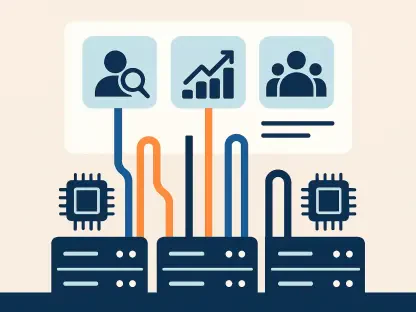In today’s fast-evolving marketing environment, staying ahead demands more than just keeping up with trends; it requires a fundamental shift in mindset to embrace change as the only certainty, especially as the field transforms into a high-pressure arena where fragmented audiences, a proliferation of platforms, and heightened expectations create a complex web of challenges for professionals. From in-house teams to external agencies, the push for hyper-personalized experiences and innovative strategies is relentless. Insights from industry leaders reveal that adaptability, continuous learning, and strategic use of technology are no longer optional but essential for success. As marketing becomes increasingly intricate, the ability to navigate this dynamic terrain with agility and foresight separates those who merely survive from those who truly excel. This discussion delves into the core strategies and mindsets that can empower marketers to not just adapt but thrive amid constant transformation.
Embracing Change as a Core Principle
The notion that change is inevitable has become a guiding principle for marketers facing an ever-shifting landscape. Industry experts emphasize that clinging to outdated methods or resisting new tools can quickly render strategies obsolete. Instead, a proactive approach to learning and adaptation is critical. This means staying informed about emerging platforms and audience behaviors while being ready to pivot when necessary. Technology, particularly artificial intelligence, plays a pivotal role in this process by offering ways to analyze vast amounts of data and deliver tailored experiences at scale. However, the key lies in using such tools with clear direction from leadership to ensure they enhance rather than hinder creative output. Marketers must cultivate a mindset that views change not as a disruption but as an opportunity to innovate and connect with audiences in meaningful ways, ensuring relevance in a crowded and competitive space.
Beyond mindset, embracing change also requires a commitment to skill development to keep pace with industry demands. As platforms multiply and consumer expectations rise, the need for upskilling becomes evident, especially in areas like data analysis and project management. These skills enable teams to execute complex campaigns with precision while maintaining a focus on strategic goals. Leaders in the field stress that continuous education fosters resilience, allowing marketers to tackle unforeseen challenges with confidence. This dedication to growth extends beyond individual efforts, necessitating a culture within organizations that prioritizes learning and flexibility. By embedding adaptability into the fabric of their operations, marketing teams can transform potential obstacles into stepping stones for innovation, ensuring they remain agile in a landscape where the only constant is transformation itself.
Leveraging Technology for Creative Freedom
One of the most transformative elements in modern marketing is the integration of technology, particularly artificial intelligence, to amplify creative potential. Far from being a threat, AI serves as a powerful ally when guided by strong leadership, enabling teams to uncover insights from data and craft personalized campaigns that resonate deeply with audiences. This technology can automate repetitive tasks, freeing up time for marketers to focus on ideation and strategy. However, success hinges on clarity of purpose—without a defined vision, even the most advanced tools can lead to wasted effort. Industry voices highlight that balancing technological adoption with human creativity is essential to avoid losing the emotional connection that lies at the heart of effective marketing. When used thoughtfully, technology becomes a catalyst for innovation, pushing boundaries in ways previously unimaginable.
Equally important is the need to structure teams and processes to support the integration of such tools. Many marketing professionals, while skilled in branding and strategy, often lack the operational expertise needed to manage complex tech-driven projects. Addressing this gap through targeted training in project management can significantly enhance efficiency. By streamlining workflows and clarifying roles, organizations empower their teams to harness technology without becoming overwhelmed by its complexities. This approach not only boosts productivity but also fosters an environment where creativity can flourish unhindered by logistical burdens. As marketing continues to evolve with technological advancements, building a foundation of structured processes ensures that innovation remains both sustainable and impactful, allowing teams to deliver results that captivate and convert.
Building Collaboration and Empathy Across Teams
Navigating the complexities of today’s marketing world also demands a renewed focus on collaboration and empathy between in-house teams and external partners. With clients often facing internal pressures to implement bold ideas, agencies must prioritize understanding these challenges and offer solutions that align with realistic goals. This mutual respect creates a partnership where creativity is supported by practical execution, bridging the gap between vision and reality. Industry perspectives suggest that fostering open communication is vital to overcoming misunderstandings and aligning objectives. When both sides operate with a shared sense of purpose, the result is a synergy that drives campaigns to new heights, resonating with audiences through authentic and well-executed messaging.
Furthermore, embedding empathy into organizational culture strengthens the ability to manage high-pressure environments effectively. Recognizing the diverse skill sets within teams and addressing gaps—such as the lack of project management expertise among brand managers—can transform how challenges are approached. Structured training programs and clear role definitions help alleviate operational stress, allowing marketers to focus on strategic and creative priorities. This collaborative spirit extends to nurturing a supportive environment where bold ideas are encouraged without fear of failure. By prioritizing understanding and teamwork, marketing professionals can build resilient frameworks that withstand the constant flux of the industry, ensuring that every campaign benefits from a unified and empathetic approach to problem-solving.
Reflecting on Strategies for Sustained Success
Looking back, the journey through the evolving marketing landscape reveals a clear consensus among industry leaders that adaptability is the cornerstone of past achievements. The emphasis on continuous learning proved to be a game-changer, as teams that invested in upskilling navigated disruptions with greater ease. Technology, especially AI, emerged as a trusted partner in unlocking creative potential, while structured processes alleviated operational burdens, allowing for sharper strategic focus. Collaboration and empathy between brands and agencies also played a crucial role, fostering environments where innovation thrived despite mounting pressures. Moving forward, marketers should consider integrating these lessons into long-term strategies, prioritizing flexible frameworks that anticipate change. Exploring partnerships for shared learning and investing in tools that balance creativity with efficiency will be vital steps. By building on these foundations, the industry can continue to evolve, turning every challenge into a stepping stone for future success.









